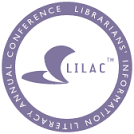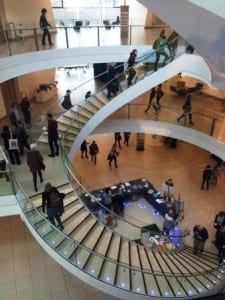LILAC Conference: 21-23 March 2016
By Kate Brunskill, on 30 March 2016
LILAC is an annual conference  organised by CILIP’s Information Literacy Group, “aimed at librarians and information professionals who teach information literacy skills, are interested in digital literacies and want to improve the information seeking and evaluation skills of all our library users whoever they may be”. Information Literacy (IL) skills underpin the training I deliver here at the UCL Institute of Neurology, so I’ve been hoping to attend LILAC for quite a while. For 2016, the LILAC team chose not to set any explicit themes for the conference, instead inviting papers covering any aspect of IL but asking authors to emphasise their innovative practice or research – this was particularly attractive to me and I was looking forward to presentations full of practical ideas.
organised by CILIP’s Information Literacy Group, “aimed at librarians and information professionals who teach information literacy skills, are interested in digital literacies and want to improve the information seeking and evaluation skills of all our library users whoever they may be”. Information Literacy (IL) skills underpin the training I deliver here at the UCL Institute of Neurology, so I’ve been hoping to attend LILAC for quite a while. For 2016, the LILAC team chose not to set any explicit themes for the conference, instead inviting papers covering any aspect of IL but asking authors to emphasise their innovative practice or research – this was particularly attractive to me and I was looking forward to presentations full of practical ideas.
LILAC runs over three days and, to be honest, it offers far too much for one person to take in. It’s very well-organised but, with over 70 parallel sessions, it really is impossible to attend everything and you have to choose the sessions that are closest to your interests and hope for the best, while following the conference hashtag (#lilac16) for an insight into what else is going on. If you decide to check out that twitter hashtag, be warned, it turns out that IL librarians like to tweet, a lot.
Luckily, I’ll be able to catch up on the sessions I missed when the presentations appear on the LILAC website (and it’s worth checking out some of the content from previous years too) but, for now, here’s a brief overview of ‘My LILAC’. If anything here takes your interest, please feel free to ask me for more details.
First, let’s get the three keynotes out of the way, they were all interesting even though I was most keen to hear about the practical stuff, in the parallel sessions. Day 1 saw Nicola Whitton and Alex Moseley talking about the use of games for teaching IL skills. This was hugely entertaining, very noisy and slightly chaotic. I wasn’t entirely convinced that the techniques would work for me, though doubtless they are very useful for anyone who needs to engage large groups of students in a lecture theatre setting. On Day 2, Char Booth was the talk of the coffee queue having inspired everyone with a talk about reflection, generally and in IL teaching – for more information have a look at Char’s slideshare. The keynote for Day 3 was James Clay speaking about Digital Capability which he summarised as “being able to live, work & learn in a digital world” – there is a Jisc project site for this initiative.
The bulk of my time was spent flitting between parallel sessions, many of which were full of practical ideas and some of which enjoyed an excellent view of the O’Brien Centre for Science. The sessions I chose included: a pair of librarians from Colorado who described how they build assessment into their teaching sessions; a librarian from a small health library who uses paper-based tasks to focus students’ attention before getting into hands-on PC work; a librarian from City who is gathering researcher case studies, hoping to map their needs onto the content of IL sessions; a librarian from Sussex who is harnessing the power of 6 second vines to promote IL sessions; a pair of librarians from Coventry who are shifting the focus of their IL sessions by reducing the ‘How to’ elements and building in more conceptual underpinnings; researchers from Brunel & Robert Gordon who are studying researchers’ use of social media and how libraries can help to integrate it into the research workflow; a Manchester-based librarian who detailed his tactics for communicating IL principles to international students; two librarians from Birmingham who deliver IL to distance learners and offered a wealth of do & don’t advice (they also proved they can engage an audience face-to-face by giving us popcorn).
and some of which enjoyed an excellent view of the O’Brien Centre for Science. The sessions I chose included: a pair of librarians from Colorado who described how they build assessment into their teaching sessions; a librarian from a small health library who uses paper-based tasks to focus students’ attention before getting into hands-on PC work; a librarian from City who is gathering researcher case studies, hoping to map their needs onto the content of IL sessions; a librarian from Sussex who is harnessing the power of 6 second vines to promote IL sessions; a pair of librarians from Coventry who are shifting the focus of their IL sessions by reducing the ‘How to’ elements and building in more conceptual underpinnings; researchers from Brunel & Robert Gordon who are studying researchers’ use of social media and how libraries can help to integrate it into the research workflow; a Manchester-based librarian who detailed his tactics for communicating IL principles to international students; two librarians from Birmingham who deliver IL to distance learners and offered a wealth of do & don’t advice (they also proved they can engage an audience face-to-face by giving us popcorn).
Just a couple of the parallel sessions were not such useful choices, for me. While it was interesting to hear a Canadian librarian describing how her team has applied the ACRL IL framework, it didn’t feel like something I could apply at one small site. A group of librarians from New York described a huge ethnographic study of users’ needs they have been undertaking. To be fair, their findings are still being analysed but their setting seemed too different to mine for me to draw direct lessons. Perhaps UCL needs its own librarian-anthropologist?
As well as the business side of the conference I had chance to explore the University College Dublin campus (www.ucd.ie). I hear that some people find the campus, on the outskirts of Dublin, a bit grim but I loved it – a lake, lots of leafy walkways (perfect for spotting birds while getting lost on the way back to my accommodation) and some strong architecture, old and new (including lots and lots of concrete which, I’m told, is not popular with everyone!). There were a couple of social events in the evenings, with librarians from all over the world getting together at two Dublin landmarks: the Chester Beatty Library and the hugely impressive Royal Hospital Kilmainham.
I hear that some people find the campus, on the outskirts of Dublin, a bit grim but I loved it – a lake, lots of leafy walkways (perfect for spotting birds while getting lost on the way back to my accommodation) and some strong architecture, old and new (including lots and lots of concrete which, I’m told, is not popular with everyone!). There were a couple of social events in the evenings, with librarians from all over the world getting together at two Dublin landmarks: the Chester Beatty Library and the hugely impressive Royal Hospital Kilmainham.
Leave a Reply
You must be logged in to post a comment.
 Close
Close

